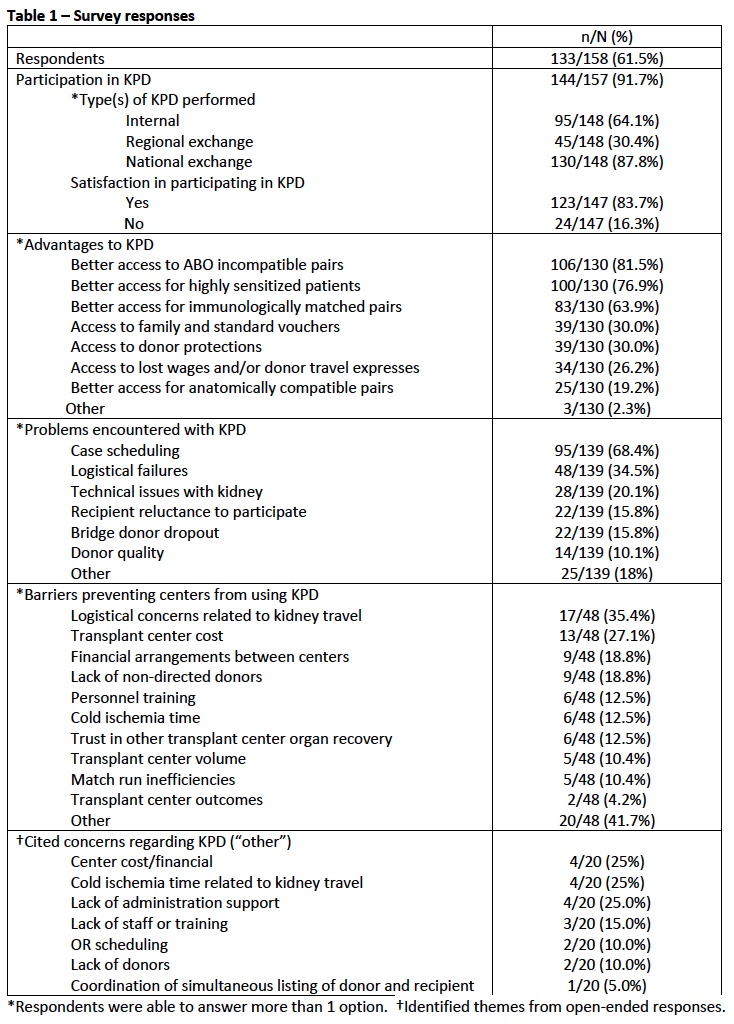The Cost And Logistical Challenges To Kidney Paired Donation
1Houston Methodist Hospital, Houston, TX, 2New York Medical College, Scarsdale, NY, 3University of Pennsylvania, Philadelphia, PA, 4Transplant Surgery, University of Virginia Health System, Charlottesville, VA, 5University of Minnesota Medical Center, Minneapolis, MN, 6Indiana University Hospital, Indianapolis, IN, 7Virgina Mason Medical Center, Seattle, WA, 8East Carolina Univ Sch of Med, Greenville, NC, 9University of Colorado, Aurora, CO, 10University of Texas Health Science Center at San Antonio, San Antonio, TX, 11Dell Seton Medical Center at The University of Texas, Austin, TX, 12St Louis University Hospital, St Louis, MO, 13University of Toledo Medical Center, Toledo, OH, 14Mayo Clinic in Arizona, Phoenix, AZ
Meeting: 2022 American Transplant Congress
Abstract number: 9056
Keywords: Kidney transplantation, Living donor, Resource utilization
Topic: Clinical Science » Kidney » 48 - Kidney Paired Exchange
Session Information
Session Time: 7:00pm-8:00pm
 Presentation Time: 7:00pm-8:00pm
Presentation Time: 7:00pm-8:00pm
Location: Hynes Halls C & D
*Purpose: Kidney paired donation (KPD) is a strategy for finding compatible pairing for living kidney transplantation (LDKT); however, only a small portion of LDKT continues to be attributed to KPD. In an effort to identify barriers to KPD, we evaluated current perceptions and utilization patterns of KPD among US transplant centers.
*Methods: A 16 question web-based qualitative survey evaluating perception and utilization of KPD was sent to all 1222 ASTS members. Multiple choice and open-ended questions to elicit responses were used. Open-ended responses were analyzed using the constant comparative method. Responses were reported anonymously.
*Results: 157 individuals responded. 91.7% (144/157) participated in KPD, with 84% (123/147) satisfied with participating. Reported advantages included ABO matching (106/130, 81.5%) and better access for highly sensitized patients (100/130, 76.9%). Disadvantages included case scheduling challenges (95/139, 68%) and surgical technical issues (28/139, 20.1%). Reasons for lack of participation in KPD included logistical concerns with kidney travel/cold ischemia time, center costs, OR scheduling, lack of administrative support, mistrust of other recovery surgeons, and lack of donors (Table 1). 61.5% (8/13) who did not participate in KPD performed less than 20 living kidney transplants annually.
*Conclusions: Both KPD participants and non-participants cited scheduling logistics as challenges to participation. Cost was also a common barrier to adoption, especially as it pertained to contracts and staff training. To increase kidney transplantation through KPD, future studies should evaluate solutions to case scheduling and financial barriers, especially among lower volume centers.
To cite this abstract in AMA style:
Yi SG, Whittaker VE, Dunn TB, Goldaracena N, Humphreville V, Kubal C, Kuhr C, Leeser D, Pomposelli J, Thomas E, Turgeon N, Varma C, Rees M, Mathur AK. The Cost And Logistical Challenges To Kidney Paired Donation [abstract]. Am J Transplant. 2022; 22 (suppl 3). https://atcmeetingabstracts.com/abstract/the-cost-and-logistical-challenges-to-kidney-paired-donation/. Accessed January 10, 2026.« Back to 2022 American Transplant Congress

